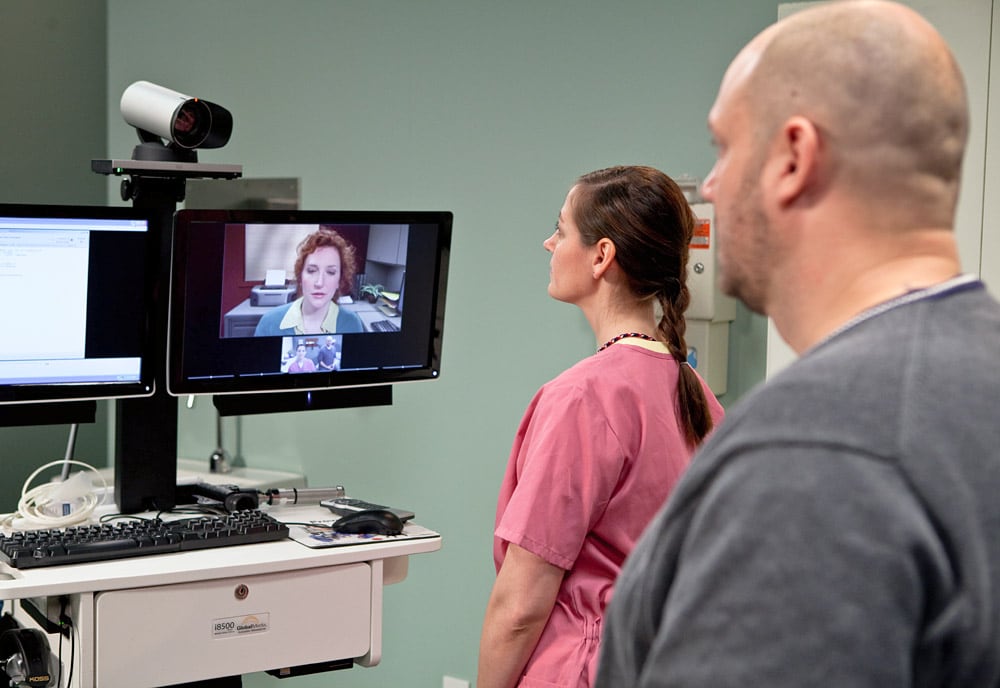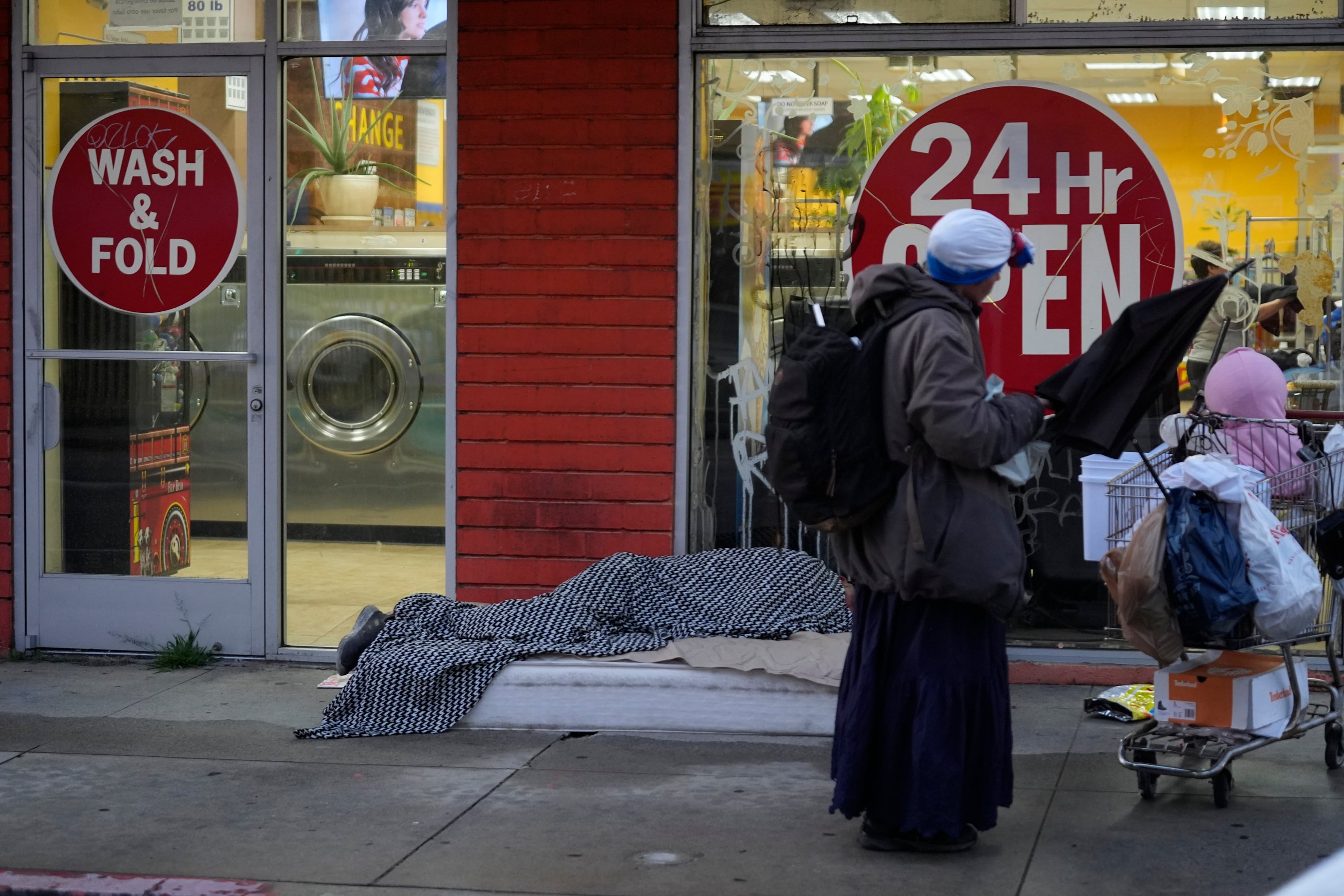CAMP LEJEUNE, N.C. — Jenna Kemp laughed nervously as she stretched out Saturday morning in the parking lot of a Han-Dee Hugo’s gas station about in rural Winnabow, North Carolina, approximately 556 miles from south of Camp Lejeune. Ignoring the light rain beginning to fall, she donned a black baseball cap, aviator sunglasses and hoisted a heavy military rucksack over her shoulders.
Along with a family friend and two Raiders, members of the Marine Corps' elite special operations force, s
It was the Kemp’s first time Kemp would be marching that she was able to ruck with the Raiders, who were approaching the end of a grueling 770-mile trek from Florida to Camp Lejeune as part of the Marine Raider Memorial March. She was there to honor Step by step, the Raiders undertook a 770-mile, eleven-day, 24/7 odyssee from Navarre, Florida, to Camp Lejeune in memory of her husband, Staff Sgt. Kerry Kemp, and 10 ten other service troops killed members who perished in a Florida helicopter crash exactly one year prior. ago.
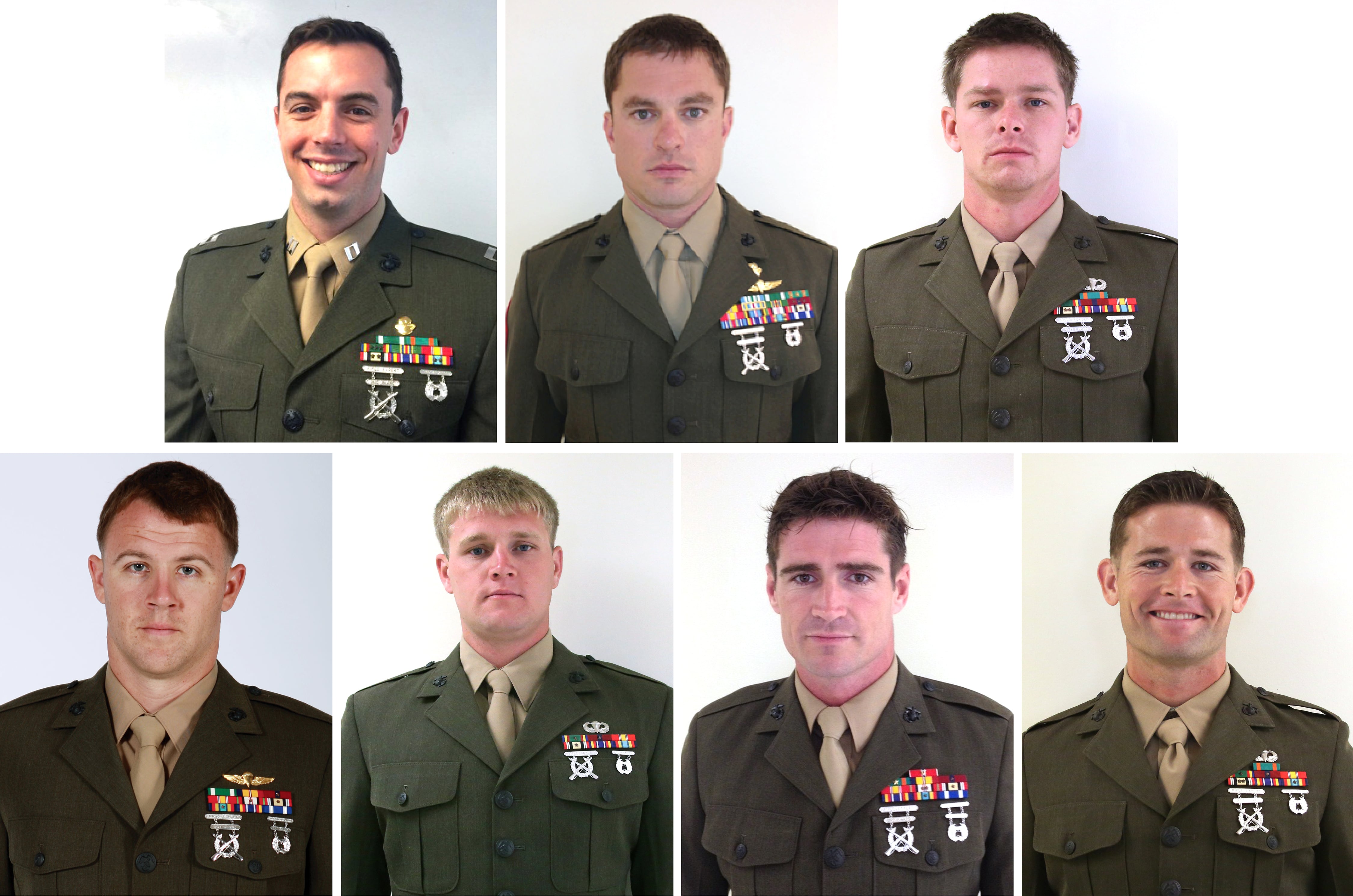
Top, left to right: Capt. Stanford Henry Shaw III, Master Sgt. Thomas Saunders and Staff Sgt. Marcus Bawol; bottom, left to right: Staff Sgt. Andrew Seif, Staff Sgt. Kerry Kemp, Staff Sgt. Liam A. Flynn, Staff Sgt. Trevor P. Blaylock
Photo Credit: Marine Corps
Staff Sgt. Kemp and six other MARSOC Marines were and While on a training mission when their on March 10, 2015, the Raider’s UH-60M Black Hawk helicopter crashed off the coast of Florida into the struck the waters of Santa Rosa Sound. from Navarre. The accident killed all took the lives of all on board - seven operators with the 2nd Marine Raider Battalion along with and four Louisiana Army Air National Guardsmen.
It marked- marking the deadliest day for the Marines' special operations command Marine Corps Forces Special Operations Command since it formed in 2006.
The tragedy ripped a deep wound throughout the community — the families, the Raiders and the Marine Corps. country - But but the epic ruck march was a chance for all to reflect on and celebrate their lives: to heal, to grow and to honor, Jenna Kemp she said.
"He was the epitome of a great man: a great husband, a great father, an outstanding Marine and I don't want this crash, his death, to define his life," she said. "He loved with all he had, so that's what I'm trying to do: I know he would want me to move forward and make him and our kids proud."

Jenna Kemp, left, lost her husband, Staff Sgt. Kerry Kemp, in a training accident. Staff Sgt. Kemp was one of seven Marine Raiders killed in a helicopter crash last year.
Photo Credit: Courtesy
The team stepped up to the side of Route 17, prepared to meet the incoming ruckers team.
Sr. Chief Petty Officer Rubens Dacosta, MARSOC’s senior enlisted medical adviser advisor, made final adjustments to the straps of his rucksack.
"To me, it's for the families," he said. "It lets the families know that we care about their loved ones, and they won't be forgotten. That's really the heart of it."
Banding together
Around the bend, the flashing lights of two state patrol cars escorting the incoming relay team crept into view. A flag carried by Gunnery Sgt. Andy Harrison, a flag snapped in the wind. It showed a white skull set in a red diamond, surrounded by five stars on a midnight blue background — the emblem of the Marine Corps Raiders.
As the teams met up, they handed off the Raider flag and a paddle — belonging to the fallen Marines, the only piece of equipment to survive the crash intact.
Marching with them was Destiny Flynn, whose husband Staff Sgt. Liam Flynn was among the fallen. She threw her arms around Jenna Kemp in an exhausted embrace.
"It’s good to see another wife," Destiny Flynn said as Jenna Kemp's team stepped off after the other team had departed down the road. "It’s good to know there’s someone else there that’s going through and understands what you’re going through."

Destiny Flynn, left, recently participated in a 770-mile hike in honor of her husband, Staff Sgt. Liam Flynn, a Marine Raider who was killed in a 2015 Black Hawk crash.
Photo Credit: Courtesy
Liam Flynn would have thought his wife she was "freakin’ crazy" for taking part in this ruck march, she said, but it was helping her deal with her loss. provided a lot of healing for her.
"It gave me a lot of time to reflect," Destiny Flynn said. "You think of memories of your husband and you just want to carry on the legacy of Liam Flynn and six other amazing men."
Over the last year, the close-knit group of women — five wives and two fiancées —fiances - relied on have leaned on each other to work through their collective grief. The Raiders crash also left behind seven children, two of whom were born after the accident.
"Those six girls, they are not just friends, they are family" Jenna Kemp said of the Raiders' partners. "I couldn’t have gotten through this last year without them. ," Kemp said. "We lean on each other for support, we do dinners together, when one of us is down, we call the other and pick each other up."
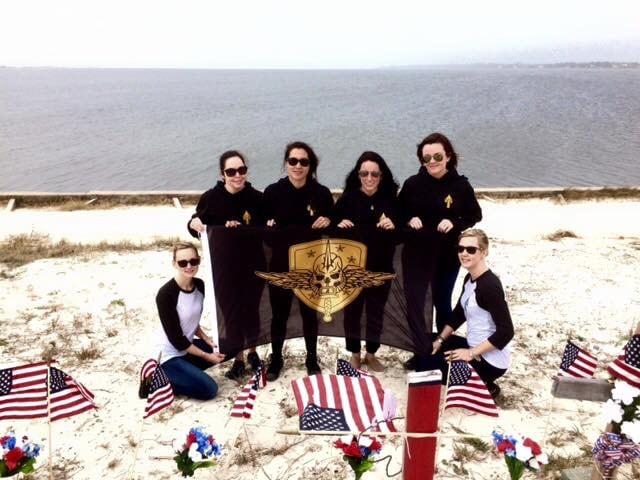
The families of seven Marine Raiders killed in a helicopter crash last year have banded together to deal with the tragedy. Left to right: Lisa Blaylock, Danielle Saunders, Destiny Flynn, Jenna Kemp, Erika Hipple, Dawn Seif
Photo Credit: Courtesy
Marine Capt. Cpt. Lindsay Pirek, who lost her fiancé Capt. fiance Cpt. Stanford Shaw III in the crash, recalled receiving the initial call from Dawn Seif, wife of teammate Staff Sgt. Andrew Seif. That moment and how they immediately banded them together.
"The initial shock was horrifying," she said. "I wouldn't have wished this on any other family, but having the seven of us, we all knew each other and were there for each other, got us through the year."
Pirek, currently deployed as a public affairs officer with the 26th Marine Expeditionary Unit, also said that the ongoing support from the Raiders themselves has been equally invaluable.
"The MARSOC community has been amazing in making sure that we are still part of the MARSOC family," she said. "After the accident, [MARSOC commander Maj. Gen. Joseph] Osterman personally talked with all the families and wanted us to know that we wouldn't be forgotten, that they weren't going to be cast out, that we're part of the family, that they take care of their own."
It’s a sentiment that has been born out in practice over the last year, each of the women told Marine Corps Times.As they have worked through their loss, together and individually, the Raider community has invariably stood by them, always faithful to the families of their fallen brethren.
None of that was just lip service, Jenna Kemp said.
"A lot of times after a service member is killed, people stick around for a month or two, because it’s fresh, it’s new, but [MARSOC] really takes it seriously when someone passes," she Kemp said. "They haven’t left our side, we know that they are always there for us and they reach out and make sure we’re OK ok and taken care of."
Honoring their own
Inside MARSOC, the crash has affected the community from the top on down: The impact of the crash hit the Raider community from on the Raiders’ world was absolute, from its top leaders the highest-ranking officers to its the rank-and-file operators. In a world of humble and quiet professionals not accustomed to bringing their work to the light of day, the bonds formed between them and their families grow immeasurably close, and the loss of the Raiders rippled through the small community of humble and quiet professionals.
"They were all good friends of us in some form or fashion," Harrison said. "Being out here [is letting] everybody know how much they mean to us, but more importantly letting their families know how much they mean to us, how much they still mean to us."
Staff Sgt. Nathan Harris knew six of the seven Raiders personally through deployments or training at the amphibious operations course in Florida, where he is an instructor. The helicopter crash set Harris on a mission to honor their legacy. On tThe very next day, he began organizing the Marine Raider Memorial March on his personal time beyond the rigorous demands of his profession.
"It's not that they're the first Marines to die; they aren't," he said. "I've always wanted to do something to give back to the families. … We have to do something to show the family members how much they mean to us."
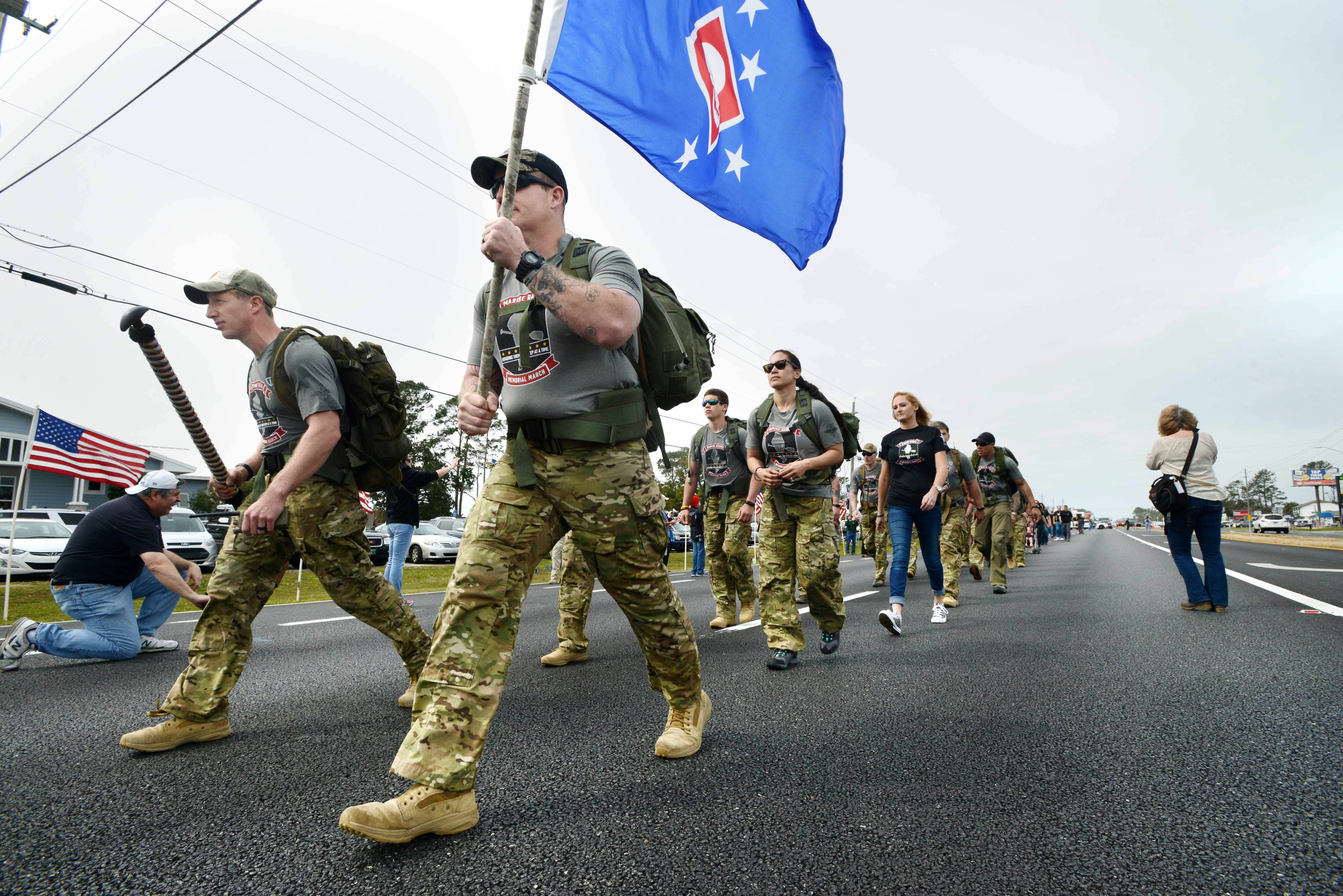
Carrying the flag of the Marine Raiders, U.S. Marines and family members begin a 770-mile Ruck March Friday, March 11, 2016, from Navarre, Fla., to Camp Lejeune, North Carolina, in memory of the seven Marines and four Louisiana National Guardsmen who died when their Black Hawk helicopter crashed March 10, 2015 near the Florida panhandle community. (Devon Ravine/Northwest Florida Daily News via AP) MANDATORY CREDIT
Photo Credit: Devon Ravine/AP
Harris began working with Brothers in Arms Foundation, a nonprofit group dedicated to supporting wounded Raiders and families of fallen MARSOC Marines. of the fallen in the Marines’ special operations community. They set out to raise funds for the seven Raider families, along with as well as basic expenses tied to the 770-mile ruck logistics along the journey.
Volunteers immediately stepped forward, and to the plate and they began planning planned the route. The team also and arranged for critical support along the way, including law enforcement escorts and food and shelter.
The route, stretching from Navarre, Florida, through Georgia, South Carolina and North Carolina, was designed to pass by as many military installations as possible, including Naval Air Station Panama City in Florida, Fort Stewart in Georgia, and Marine Corps Recruit Depot Parris Island and Marine Corps Air Station Beaufort in South Carolina.
Breaking into seven relay teams of three to four people — including current and former Raiders, family members and friends of the fallen — they stepped off on slogged day and night in 10-12 mile stretches towards Stone Bay, MARSOC's headquarters here.
Key to march was the paddle that was passed between Destiny Flynn and Jenna Kemp’s teams. After it was recovered from the crash site, it was and inscribed with the names of the fallen by the surviving members of Marine Special Operations Team 8231.
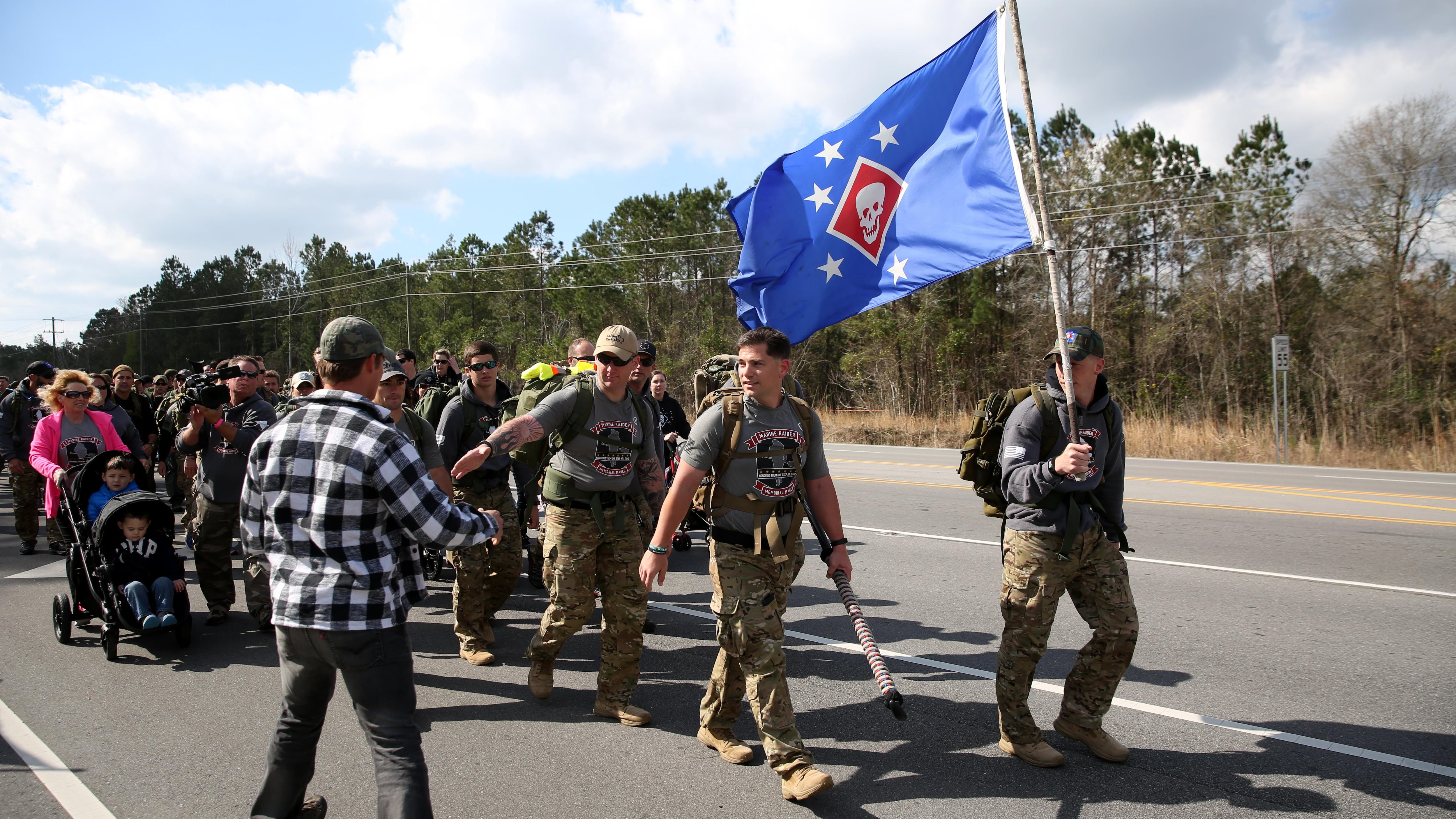
The local community lined the streets and cheered on the ruckers as they finished the Marine Raider Memorial March outside the Stone Bay main gate, at Marine Corps Base Camp Lejeune, N.C., March 21, 2016. The Marine Raider Memorial March was designed to honor the seven Marine Raiders who died on March 10, 2015 and their families, as well as bring awareness to their sacrifice. The ruckers were made up of both active duty and former Raiders, family members, and close friends. Following the conclusion of the March there was a short ceremony to honor the fallen.
Photo Credit: Sgt. Donovan Lee/Marine Corps
Even while the other relay teams rested, the paddle continued moving throughout the march.
In passing that paddle, the Raiders were also honoring their legacy. When the unit was first formed in World War II to conduct high-speed amphibious landings and surprise raids behind enemy lines in the Pacific, each Raider was issued a paddle. In the event of death, his paddle was inscribed and presented to surviving family members. MSOT 8231’s paddle, inscribed with the names of the fallen Raiders, was now en route to the MARSOC family at Stone Bay.
The paddle found among the helicopter wreckage was headed home.
'An incredible accomplishment'
Outside the gates of Camp Lejeune on Monday morning, outside of Camp Lejeune, two days after the paddle passed from Flynn’s to Kemp’s team, hundreds of kids of the nearby Dixon Elementary School lined surged the chain link fences, their American flags flapping against the crisp Spring breeze. In near-unison they belted out "U-S-A!!" with an intensity to rival any tickertape parade, nearly drowning out a nearby bagpiper’s refrain of ‘God Bless America’.
The children reached out their hands, eager for a high-five from the 19 men and women passing by on the final mile of the final leg of the Marine Raider Memorial March. Despite their visible exhaustion under the weight of heavy rucksacks, the adults beamed and exuberantly returned high-fives, hugs and salutes.
"By doing this ruck march, we set out to humanize the accident and let the world know that there were 11 men that died on that helicopter, and there are 11 families still reeling from it," Harris said. "For us to put the faces behind the names and honor the families means that we were successful. Here we are less than a mile away from our endpoint: I've never been sorer, but my heart's never been fuller."
As they neared their endpoint homecoming, several hundred supporters lined sparsely populated North Carolina Highway Route 210 to cheer them ion, waving American flags and posters that stated placards reading "Never above you, never below you, always beside you."
At 10:45 a.m., the group crossed through the gates to enter Stone Bay.
Marching past Marines and MARSOC's leaders were brass lined up to welcome them home. The ruckers they made their way to the parade field and finally dropped their heavy packs rucks.
Unwavering, they stood at attention for the National Anthem before hundreds of Marines and the Gold Star families who had come to support them. see them home.The chaplain referenced observed their sacrifices and the physical hardship they had endured, and noted that they could not do it alone.
Harris stepped to the mike and agreed, humbly thanking the myriad supporters who helped make had made the march possible happen.
Osterman, MARSOC's commander, said the 770-mile march required a high level of discipline.
"Think about that ... think about [...] 770 miles; what that takes, what kind of discipline, and what it means to get it all done in just 11 days," he said. MARSOC Commander Maj. Gen. Joseph Osterman said. "It really is an incredible accomplishment."
Harris then asked Lt. Col. Craig Wolfenbarger, commander of the 2nd Marine Raider Battalion, to come to the podium.
Destiny Flynn stepped forward to as well to gracefully place the paddle from of her husband’s team into Wolfenbarger’s hands. He stood silently reflecting on it before addressing the crowd.
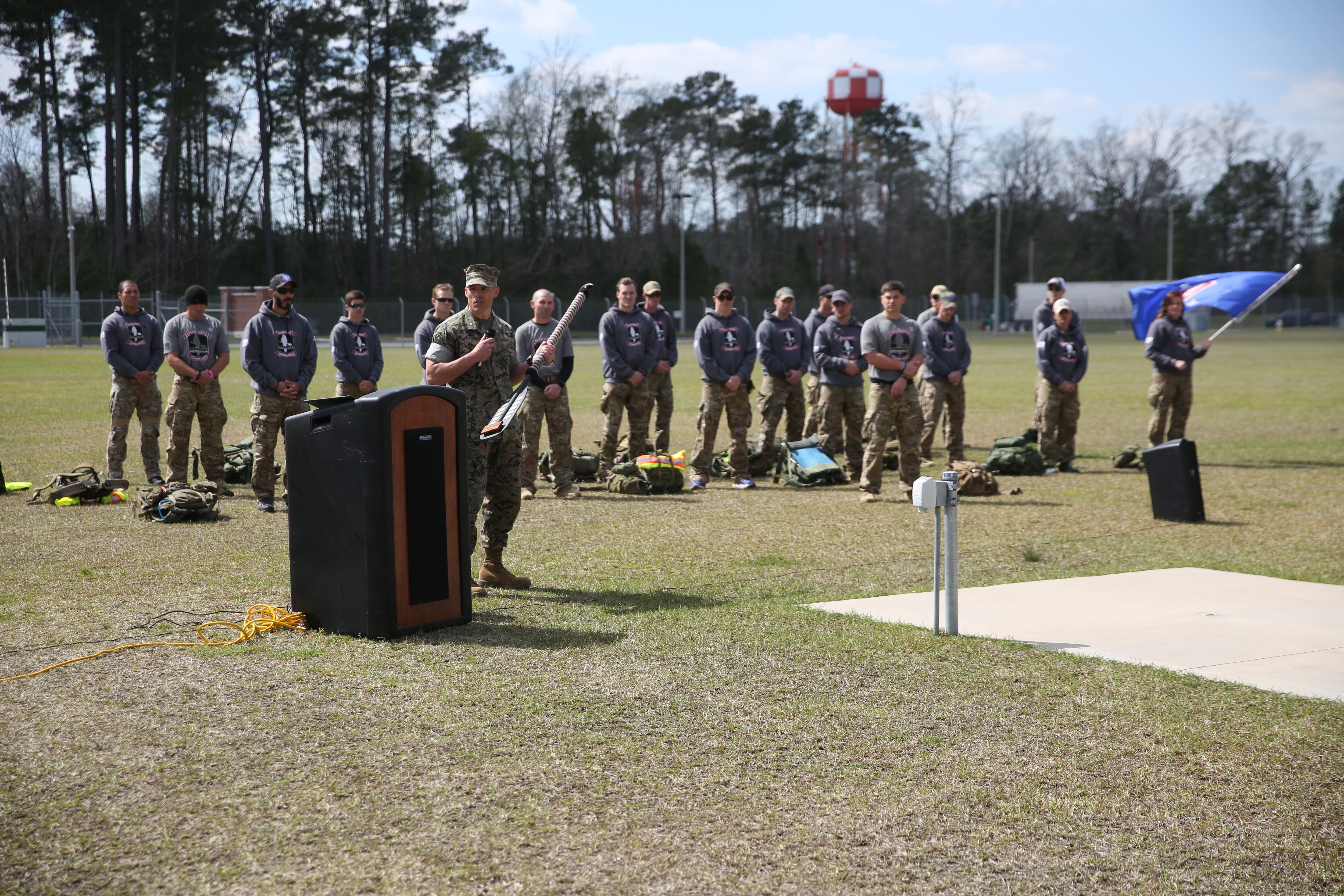
Lt. Col. Craig Wolfenbarger, commanding officer of 2nd Marine Raider Battalion, speaks about the paddle inscribed with the names of seven fallen Marines.
Photo Credit: Sgt. Donovan Lee/Marine Corps
"Now that this paddle has been brought home, it will go to its rightful place in the hall of honor at 2nd Raider Battalion, where it will provide us a daily reminder of the immeasurable contribution of these men to our great nation and also a reminder of our responsibility to honor and uphold their legacy," Wolfenbarger said.
"To those that rucked, my sincerest gratitude and deepest admiration for what you have done to bring this paddle home to us."
The brief ceremony - and the Raiders' 770-mile journey to bring the fallen home - concluded with Harris calling on all current and former Raiders to drop and give 25 and five.
Matthew L. Schehl covers training and education, recruiting, West Coast Marines, MARSOC, and operations in Europe, Africa and the Middle East for Marine Corps Times. He can be reached at mschehl@marinecorpstimes.com.


